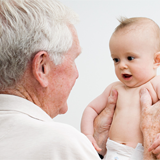Famous People with Name Hsin
Babynology >> Chinese Baby Names >> Famous People with the Name Hsin
Famous People with Name Hsin
Hsin as First Name
Hsin Pei  Origin/Culture/Country: Chinese
Origin/Culture/Country: Chinese
Hsin Pei: is the seventh and current abbot and director of the Fo Guang Shan Buddhist Order. The youngest abbot ever elected to the order, Hsin Pei was elected by the members of Fo Guang Shan worldwide in 2004 and succeeded retiring abbot Hsin Ting in 2005. As abbot of the Order, Hsin Pei is the second highest monastic in the order, and is second in line to the position of head teacher. After his preceptor, Venerable Master Hsing Yun who is a forty eighth generation lineage holder of the Linji Chan School, Hsin Pei and his predecessor Hsin Ting are the forty ninth generation lineage holders.
Hsin Ping  Origin/Culture/Country: Chinese
Origin/Culture/Country: Chinese
Hsin Ping: was the fourth and fifth abbot of Fo Guang Shan and the dharma heir to Hsing Yun, founder of Fo Guang Shan. Hsin Ping was the forty-ninth lineage-holder of the Linji Ch'an school through Hsing Yun. Venerable Hsin Ping entered the Buddhist sangha in 1963. Hsin Ping went on to receive the precepts under Master Tao Yuan of Hai Hui Temple in Keelung in 1963, and went on to attend Shou Shan Buddhist College and the Chinese Buddhist Research Institute at Fo Guang Shan. For lengths of time during the earliest days of Fo Guang Shan, Hsin Ping was stationed in the construction quarters. In 1973, he became first in line of Fo Guang Shan’s order of precedence. Admired for his melodious voice in chanting and his kind, easygoing character, Hsin Ping was known to have been one of the best loved of the leading monastics. Shown for being sincere and compassionate towards monastics and lay practitioners, he, along with the support of monastics, built temples worldwide so they could strengthen the order as well as to propagate Buddhism. He had also made affinities with people through Buddhist music.
Hsin Ting  Origin/Culture/Country: Chinese
Origin/Culture/Country: Chinese
Hsin Ting: is a Buddhist monk from Taiwan who served as the sixth abbot and director of Fo Guang Shan from 1997 to 2005. He served as acting abbot for three years after the sudden death of his predecessor, the Venerable Hsin Ping, in 1995. Hsin Ting currently serves as the President of Buddha's Light International Association. Hsin Ting was born in Yunlin county. He was born into a family of farmers and grew up in the country. In 1968, he became a monastic under Master Hsing Yun and took full ordination the following year in Keelung. Hsin Ting graduated from the Eastern Buddhist College and the India Research Institute of the Chinese Cultural University. He further received an Honorary Doctorate Degree from the Fo Guang Shan-affiliated University of the West in Rosemead, California in 1998. As a monastic of Fo Guang Shan, Hsin Ting has held a variety of posts, such as the secretary of Fo Guang Shan's Religious Affairs Committee, the Managing Director of the Ilan Buddhist Society, abbot of Long Hua Temple in Malaysia, abbot of Hsi Lai Temple in California, abbot of Taipei's Pu Men Temple, and of Kaohsiung's Pu Hsien Temple, President of the American Buddhist Youth Association, and Vice President of Buddha's Light International Association of R.O.C.
Hsinbyushin  Origin/Culture/Country: Asia
Origin/Culture/Country: Asia
Hsinbyushin: was king of the Konbaung dynasty of Burma (Myanmar) from 1763 to 1776. The second son of the dynasty founder Alaungpaya is best known for his wars with China and Siam, and is considered the most militaristic king of the dynasty. His successful defense against four Chinese invasions preserved Burmese independence. His invasion of Siam (1765–1767) ended Siam's Ayutthaya Dynasty. The near simultaneous victories over China and Siam has been referred to as testimony "to a truly astonishing elan unmatched since Bayinnaung." He also raised the Shwedagon Pagoda to its current height in April 1775. The deputy commander-in-chief during his father's reunification campaigns (1752–1759), Hsinbyushin as king pursued an expansionist policy against his neighbors. By 1767, his armies had put down a rebellion in Manipur, captured the Laotian states, temporarily defeated Siam, and driven back two invasions by China. But his reckless decision to wage two simultaneous wars against China and Siam nearly cost the kingdom its independence. The third Chinese invasion of 1767–1768 penetrated deep into central Burma, forcing Hsinbyushin to hastily withdraw his armies from Siam. While the reinforced Burmese armies defeated the Chinese, and reached an uneasy truce in 1769, the Chinese threatened another invasion for another decade, and prevented Hsinbyushin from renewing the war with Siam.
Hsing Yun  Origin/Culture/Country: Chinese
Origin/Culture/Country: Chinese
Hsing Yun: is a Chinese Buddhist monk and the founder founder of the Fo Guang Shan Buddhist order and the affiliated Buddha's Light International Association, one of the largest international Buddhist organizations in Taiwan and in the Buddhist world. Hsing Yun is a forty-eighth generation lineage holder of the Linji Chan (Rinzai Zen) school through Master Zhi Kai, his teacher. He served as the first, second and third term director and abbot of the order before voluntarily resigning his position in 1985 in favor of his disciple, Hsin Ping.
Hsin as Last Name
Winnie Hsin  Origin/Culture/Country: Asia
Origin/Culture/Country: Asia
Winnie Hsin: a Taiwanese balladeer. She is best known for her crystal-clear soprano voice.In 1976 she was admitted to the Taipei Hwa Kang Arts School (??????), and in 1979 she studied music in the Chinese Culture University (??????) in Taipei. After graduation, she became a music teacher in the established Yamaha Music School in Taipei.Her first album, Lonely Winter (????), was released in 1986. She has released 16 albums thus far, under the respective labels of Decca Records,Rock Records and Warner Music.
Huang Hsin  Origin/Culture/Country: Asia
Origin/Culture/Country: Asia
Huang Hsin: is a Taiwanese professional pocket billiards (pool) player.
Chen Hsin-An  Origin/Culture/Country: Asia
Origin/Culture/Country: Asia
Chen Hsin-An: is a professional basketball player from Taiwan. He plays small forward in Taiwan, while adjusting to play shooting guard in leagues where there are bigger lineups.
Yen Hsing-Shu  Origin/Culture/Country: Asia
Origin/Culture/Country: Asia
Yen Hsing-Shu: is a Taiwanese professional basketball player, singer, actor, and model. He is a former member and captain of both the Chinese Taipei men's national basketball team and 183 Club. Nicknamed "The Basketball Genie" (????), Yen was a high school star and turn
Chinese Names Categories
Top Baby Names
Parenting Tips
-
 Positive praising will encourage the child to do the good behavior. It will also boost the confidence, and the child will grow positively.
Positive praising will encourage the child to do the good behavior. It will also boost the confidence, and the child will grow positively. -
 If you find that the child is behaving wrong, try to find the reason behind it, instead of focusing on his attitude.
If you find that the child is behaving wrong, try to find the reason behind it, instead of focusing on his attitude. -
 As you know, your child the best, discuss the issues beforehand and try to get a result which is good and positive for your child.
As you know, your child the best, discuss the issues beforehand and try to get a result which is good and positive for your child.
Baby Photo Contest May, 2025
Vote For May, 2025
Immigrant Baby Names and the Ethnic Identity
If you have immigrated from your home country and have finally arrived in your land of dreams and opportunities, an ethnic name which reflects your original culture just might pose a minor challenge or two. There is no harm in trying ....
English Names | Indian Names | Islamic Names | South American Names
African names | American names | Arabic names | Australian names Celtic names | English names French names | Gaelic names | German names | Greek names | Hebrew names | Hindu names Indonesian names | Iranian names | Irish names | Japanese names | Korean names | Latin names Malaysian names | Mexican names | Muslim names | Nigerian names | Portuguese names Romanian names | Russian names | Spanish names | Thai names | Vietnamese names
List of Chinese baby names, Chinese babies names, Chinese baby names and meanings has been compiled from various resources. Please use this up to date list of Chinese name as a reference to name your kid/child. This vast database of Chinese names has been compiled from various references and suggestions provided by our web site users and resources partners. This information is developed to primarily serve as a reference. We are unable to respond on request for personalized assistance at the moment. Thank you for your support. Largest list of Chinese baby names with meanings, numerology, popularity and comments.
© Copyright 2025 Babynology









